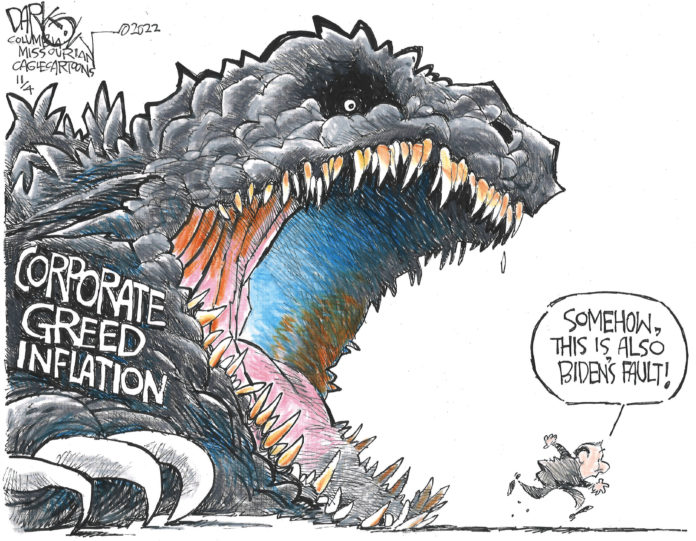Constant corporate propaganda and the spiels of their purchased politicians – mostly of the Republican persuasion – have convinced many Americans that a big, bad government is out to get them.
It is a case of mass hysteria, an epitome of the Stockholm Syndrome, with those held hostage identifying with their oppressors.
The inflation rate is dropping. The stock markets keep rising – with little hiccups engineered by profiteers. Bidenomics is a success. Yet, most Americans find higher prices every time they go to the store.
Republicans want to blame Democrats, but …
At the end of June, Jake Johnson of Common Dreams reported, “Economists with the International Monetary Fund … echoed what progressive experts and campaigners around the world have been arguing for more than a year: Corporate profiteering has been a key driver of the recent inflation surge.
“As the paper explains, companies have hiked prices beyond what was necessary to cover the rising prices of energy and other materials, passing greater costs onto consumers.”
Johnson cited International Monetary Fund economists who concluded that “just under 45% of the inflation spike during the coronavirus pandemic” was due to price gouging.
The research was based in Europe, but we can be confident the results cross the Atlantic since most corporations are multi-nationals with allegiance only to their greed.
And many corporations brag about their method.
According to a report from Accountable.US, a watchdog group, “Some of the largest general consumer S&P 500 companies have admitted to benefiting from increased prices as their net profits increased year-over-year and they rewarded shareholders with billions in handouts.”
Kimberly-Clark – Kleenex, Cottonelle, Scott and Viva among many paper products – called its price gouging “broad pricing actions,” adding that “pricing has continued to be a big driver behind our top line growth.”
As with other companies, if the price hikes were caused by a scarcity of materials or delivery costs, those costs would have eaten into the “$1.7 billion in stock buybacks and dividends” it awarded its shareholders.
Other euphemisms that reveal the high-cost culprits, as reported by Accountable.US:
- General Mills called it “getting smart about how we look at pricing”
- Tyson Foods saw “significant pricing power of our portfolio” – and then sold its pet treats business to General Mills for a cool $1.2 billion.
Accountable.U.S reported also that “in 2022, S&P 500 companies spent a record $922.7 billion on stock buybacks and a record $546.6 billion in dividends.”
That was our money before an obsession with obscene profits changed the consumer arena.
Don’t worry. Big Oil, too, is in on the action. Common Dreams’ Johnson reported in May that “The British oil behemoth Shell reported a record $9.6 billion in first-quarter profits … and announced $4 billion in stock buybacks, prompting fury from environmentalists and progressive lawmakers who say the fossil fuel industry’s profiteering is grotesque amid a worsening climate emergency and cost-of-living crises across Europe.”
Johnson pointed out, “Climate advocates reacted with disgust to Shell’s earnings announcement, which came days after BP [British Petroleum] posted nearly $5 billion in profits for the first three months of 2023.”
For the fourth quarter last year, ExxonMobil, Marathon Petroleum and Phillips 66 showed $18.2 billion in profits, bringing their 2022 profits to more than $82.5 billion – “a 148% increase in profit margins” over 2021, as reported by Common Dreams.
Those higher prices at the pump [and in the food aisles] are not caused by shortages – except of the moral variety.
And Big Pharma willy-nilly raises prices regardless of the lives it puts in jeopardy.
Yet, in a state like Oklahoma, where maybe two dozen non-politicians stand to profit from Republican economic policies, the big lies of big business keep voters in line to vote against their own economic interests.
It was big business, not big government that began dismantling American industry in the 1980s by outsourcing its production to cheaper labor markets – child labor and virtual slavery not excluded. Led by Ronald Reagan, this initial assault on the American middle class succeeded when our government was complicit in creating the Midwestern Rust Belt.
Also in the ‘80s, other predatory capitalists gained infamy as corporate raiders – buying companies outright or gaining sufficient influence to insist upon selling off company assets and firing workers for short-term profits with no regard for the company’s product or its future.
It was big business, not big government, that gutted these industries and sent dedicated workers into unemployment lines. And while the first raiders were reviled by competitors still as interested in products as profits, the raider, the anti-business model, soon became the enforced norm as hedge funds got into the business of buying businesses to devastate in order to benefit equally unproductive shareholders.
We need a government big enough to battle big businesses. They’re the ones who closed the plants, shipped the jobs to foreign lands and despoil all creation. We need a united front to confront their perfidy.
Instead, in the ‘90s, we got Newt Gingrich and his wrecking crew that instituted the new GOP norm of scuttling government altogether to allow their donors a free hand to pick our pockets. A contract with America? More accurately a contract on America, a mob hit on working people, who, unfortunately, seem satisfied that hating the same people as their oppressors makes them pals.
The corporate onslaught on Americans is best exemplified by the realization that, if the U.S. minimum wage of the eighties had kept pace with skyrocketing Wall Street bonuses, it would now be $42 an hour.








